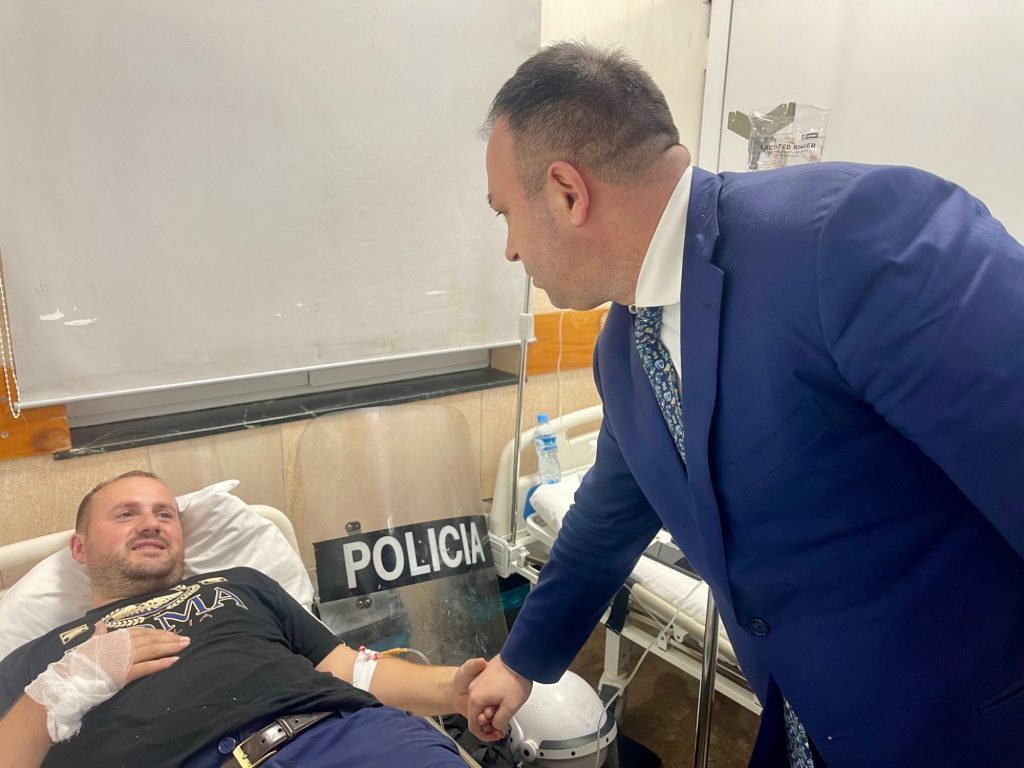
In the wake of a large-scale protest in Tirana, Albania’s Interior Minister, Ervin Hoxha, delivered a statement that has sparked widespread outrage, branding the demonstrators as a “confused crowd” driven by political motives. His comments, alongside a photo opportunity of him visiting injured police officers in the hospital, have raised concerns over the government’s deepening disregard for civil liberties and the right to protest.
In a statement that rivals the bombastic rhetoric of other prominent figures in Prime Minister Edi Rama’s administration, Hoxha dismissed the protesters as little more than an orchestrated mob, devoid of legitimate grievances. His remarks also took aim at the concept of civil disobedience, a cornerstone of democratic protest, which he derided as an insult to the intelligence of Albanian citizens.
“Those who orchestrated tonight’s disgraceful display in the streets of Tirana have already returned to their homes,” Hoxha declared. “But those who unfortunately cannot return home tonight are three police officers, injured while doing their duty.” He praised the police for showing “professionalism and restraint,” even as he disparaged the demonstrators for engaging in what he called “criminal acts.”
Such language not only undermines the right to peaceful protest, but it also exemplifies the government’s increasing tendency to vilify dissenters rather than engage with their concerns. The protesters, described as a disorganized mob, represent a broad swath of Albanian society—citizens who are, in fact, exercising their constitutional right to express dissatisfaction with the government. Yet, Hoxha’s rhetoric serves to delegitimize these voices, reducing their grievances to politically motivated chaos.
What is particularly troubling is Hoxha’s outright mockery of civil disobedience, a tactic that has historically been central to movements for justice and equality. “Civil disobedience that insults the intelligence of every citizen in this country,” he stated, dismissing the legitimacy of one of the most peaceful forms of protest. His words ignore the role that civil disobedience has played in transformative movements across the globe—from the civil rights struggles led by Martin Luther King Jr. to Gandhi’s fight for India’s independence.
In an effort to control the narrative, Hoxha shifted focus to the police officers injured during the protest, sharing images of his hospital visit as a gesture of solidarity. While the injuries are indeed tragic, the government’s focus on them, rather than the issues that brought thousands into the streets, is seen by many as a deflection tactic. It is an all-too-familiar playbook: divert attention from the public’s legitimate grievances by highlighting the state’s suffering at the hands of the protesters.
No one disputes that violence against police is unacceptable. However, the minister’s attempt to use these incidents to vilify the entire protest is deeply problematic. His declaration that the “confused crowd” was spurred by “absurd political motivations” reflects a broader pattern of the Albanian government’s dismissive attitude towards dissent. Rather than addressing the roots of the discontent, Hoxha chose to frame the protestors as lawbreakers deserving of retribution.
More troubling still is his assurance that those responsible for “illegal acts” will be held accountable, stating, “Each act has been documented, and each perpetrator is now subject to law enforcement.” This thinly veiled threat adds to a growing sense that the government is not only unwilling to engage with dissent but actively seeks to punish those who challenge its authority.
The reality, however, is that the so-called “confused crowd” includes Albanian citizens from all walks of life—people whose taxes pay for the salaries of Hoxha and his police force. In treating them as adversaries, rather than citizens with legitimate concerns, the government further alienates the public and deepens the political divide.
At its core, the minister’s statement reveals a government that has grown increasingly out of touch with the people it is supposed to serve. Instead of fostering dialogue, Hoxha and his colleagues have opted for a strategy of polarization, seeking to discredit and silence opposition voices. This approach may serve the short-term interests of the ruling party, but it does nothing to address the underlying issues that brought thousands to the streets in the first place.
As the political temperature in Albania rises, it is worth remembering that those in power are accountable to the very citizens they now disparage. Minister Hoxha’s rhetoric may be aimed at silencing dissent, but it serves as a stark reminder of the growing disconnect between the Albanian government and its people.
